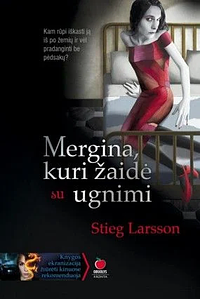Take a photo of a barcode or cover
I have finally gotten the opportunity to finish Larsson's second installment of the Millenium Trilogy, two or so years after reading The Girl with the Dragon Tattoo. In terms of writing a review, I am as perplexed as to what to say, just as I was after the first book. I give it four stars because though I didn't feel the Earth shake upon completion, at the end, I had forgotten about all of the negative opinions I had formed during the first section and a half of the book and found myself gratified at how it played out.
While I was non-committal as to my assessment of Larsson's writing style in my previous review, I am now solidly in the camp that enjoys his narrative abilities. I am convinced that, had he lived, he would be to the police detective/investigation/espionage genre what John Grisham is to "legal fiction". Larsson is skilled at weaving a complex narrative, creating and integrating a wide range of characters, and has an interesting way of revealing details very early in a narrative only to NOT ruin the inevitable final revelation of those details in the end. For example, you could suspect very early on that Niedermann was the killer, but his relationship with Zala, his relationship to Salander, etc. was paced nicely (and intuitively).
My review would be incomplete if I did not comment on the Salander character. Two very close friends of mine, whose literary opinions I respect very much, love her character. I find her (simultaneously) maddeningly under-developed and over-developed. (Though I will admit that her character came into focus as this novel wore on.) Her mystique was justified in "Dragon Tattoo" and I had no problem with the peripheral details of her life and why she was the way she was. She was an accessory to the main plot and provided a nice change of pace in the form of a sub-plot, just as the Blomkvist character did. I just don't feel that she can be the central character of a piece of fiction without portions of the work delving into the overly cliche. Whereas Larsson is skilled at withholding details as to the central "case" of his novels, I find his attempts to do so with a character frustrating and, at times, jarring. Just about the time we start to sketch a picture of Lisbeth, we are given something else that shatters that image. With some characters this isn't a bad thing; but in the case of Lisbeth, there's little consistency with the other aspects that we've learned. For instance, I found her points of vanity (e.g., the cosmetic surgery, the details of her relationship with George Bland, the furnishing of her apartment, etc.) in "Played with Fire" too far removed from what we had learned in "Dragon Tattoo". Vulnerability I would have welcomed; vanity was too far in the direction of "she's really just like any other girl". I will admit that I have no knowledge of the mental condition with which she is most closely associated (Aspergers), which may push me toward such a conclusion.
Larsson obviously asserts his themes of injustice and morality through Lisbeth, but the injustices dealt to her border on the edge of any realistic plausibility. Portions of her character feel like a writing exercise - i.e., how many bad things can we make happen to this girl? She was abused and that had led to a number of failed and abusive relationships as she grew older - I can appreciate such details. Her abuse and subsequent actions keep her on the radar of a number of law enforcement agencies - plausible, but questionable. She is secretly watched as a central figure in national security and part of a supreme cover up? Not sure about that one...
Consequently, my disconnect with the Salander character made the first 300 or so pages of this book extremely difficult for me. Much like other reviews that I have read, I found myself wondering when we were going to launch toward the central mystery of the book. Upon launch, I couldn't put the book down. Further, I enjoyed the minor themes of power, considering alternate definitions of success as well as love, and revenge and found them suitable additions to the narrative.
I look forward to reading The Girl Who Kicked the Hornet's Nest and have a copy of it on my shelf, but I will take a much-needed step away from the seemingly unending crime drama of Sweden.
While I was non-committal as to my assessment of Larsson's writing style in my previous review, I am now solidly in the camp that enjoys his narrative abilities. I am convinced that, had he lived, he would be to the police detective/investigation/espionage genre what John Grisham is to "legal fiction". Larsson is skilled at weaving a complex narrative, creating and integrating a wide range of characters, and has an interesting way of revealing details very early in a narrative only to NOT ruin the inevitable final revelation of those details in the end. For example, you could suspect very early on that Niedermann was the killer, but his relationship with Zala, his relationship to Salander, etc. was paced nicely (and intuitively).
My review would be incomplete if I did not comment on the Salander character. Two very close friends of mine, whose literary opinions I respect very much, love her character. I find her (simultaneously) maddeningly under-developed and over-developed. (Though I will admit that her character came into focus as this novel wore on.) Her mystique was justified in "Dragon Tattoo" and I had no problem with the peripheral details of her life and why she was the way she was. She was an accessory to the main plot and provided a nice change of pace in the form of a sub-plot, just as the Blomkvist character did. I just don't feel that she can be the central character of a piece of fiction without portions of the work delving into the overly cliche. Whereas Larsson is skilled at withholding details as to the central "case" of his novels, I find his attempts to do so with a character frustrating and, at times, jarring. Just about the time we start to sketch a picture of Lisbeth, we are given something else that shatters that image. With some characters this isn't a bad thing; but in the case of Lisbeth, there's little consistency with the other aspects that we've learned. For instance, I found her points of vanity (e.g., the cosmetic surgery, the details of her relationship with George Bland, the furnishing of her apartment, etc.) in "Played with Fire" too far removed from what we had learned in "Dragon Tattoo". Vulnerability I would have welcomed; vanity was too far in the direction of "she's really just like any other girl". I will admit that I have no knowledge of the mental condition with which she is most closely associated (Aspergers), which may push me toward such a conclusion.
Larsson obviously asserts his themes of injustice and morality through Lisbeth, but the injustices dealt to her border on the edge of any realistic plausibility. Portions of her character feel like a writing exercise - i.e., how many bad things can we make happen to this girl? She was abused and that had led to a number of failed and abusive relationships as she grew older - I can appreciate such details. Her abuse and subsequent actions keep her on the radar of a number of law enforcement agencies - plausible, but questionable. She is secretly watched as a central figure in national security and part of a supreme cover up? Not sure about that one...
Consequently, my disconnect with the Salander character made the first 300 or so pages of this book extremely difficult for me. Much like other reviews that I have read, I found myself wondering when we were going to launch toward the central mystery of the book. Upon launch, I couldn't put the book down. Further, I enjoyed the minor themes of power, considering alternate definitions of success as well as love, and revenge and found them suitable additions to the narrative.
I look forward to reading The Girl Who Kicked the Hornet's Nest and have a copy of it on my shelf, but I will take a much-needed step away from the seemingly unending crime drama of Sweden.
I loved this book even more than the first and can't wait to read the last one! The plot twists aren't totally unexpected but I was so caught up in the moment that I didn't even have the time to analyze what might come next. I would highly recommend this book!
veel te veel info, boek had zeker de helft korter kunnen zijn. daardoor had ik soms moeite om m'n aandacht er bij te houden en begon ik me te irriteren. Toch is de kern van het verhaal wel boeiend.
a very good book, but there are others in that genre that are way better.
I liked this book better than the first, but I'm not yet getting why these books have been so immensely popular.
Great book! I love this series and can't wait to read the last book!
i liked this story way more than i did the first.
perhaps it's because i was already familiar with the characters and i didn't have to go through that whole "intro" portion again. perhaps it was that this story was more interesting to me (i just didn't love the corporate intrigue plot in dragon tattoo). perhaps it is because the book really delves into the past (and present) of our antiheroine, lisbeth salander. we finally get some answers on why she is the way she is, what "All The Evil" means, and why she's the woman who hates men who hates women.
i think that larsson has incredibly strong and interesting characters in both salander and blomkvist, great for writing more and more sequels, and even better for making films out of these books. it's disappointing to think that there's only 1 more book to go. this light was extinguished way too early.
perhaps it's because i was already familiar with the characters and i didn't have to go through that whole "intro" portion again. perhaps it was that this story was more interesting to me (i just didn't love the corporate intrigue plot in dragon tattoo). perhaps it is because the book really delves into the past (and present) of our antiheroine, lisbeth salander. we finally get some answers on why she is the way she is, what "All The Evil" means, and why she's the woman who hates men who hates women.
i think that larsson has incredibly strong and interesting characters in both salander and blomkvist, great for writing more and more sequels, and even better for making films out of these books. it's disappointing to think that there's only 1 more book to go. this light was extinguished way too early.
La trama. Empieza muuuuy lento. Muchas de las veces parece que solo te esta dando información innecesaria por el simple hecho de hacer mas, y mas paginas. Demasiada exposicion, se siente como si toda primera mitad del libro fuera el texto de introducción de Guerra de las Galaxias. Es mucho mas tedioso que el primero, al menos la primera mitad.
Luego agarra monte. De pronto todo es emocionante y por fin después de 1 libro y medio y mas de mil paginas dentro de la serie empiezas a compaginar en la opinión sobre Lisbeth con el autor. En el primer (y la mitad del segundo libro) te la describen como alguien ridículamente inteligente, con memoria fotográfica, con la capacidad de entender algo con solo mirarlo, el mas grande genio de la informática de todos los tiempos, pero todas estas afirmaciones parecen vacías. Solo aseveraciones lanzadas al aire que no impactan realmente la historia, ya que nunca las usa. Parece la imagen grandiosa que un autor quiere dar a su personaje principal, pero sin saber como. Pero en la segunda mitad de este libro ya empiezas a comprender y a estar de acuerdo con el autor.
El libro termina bien, de una forma algo cliché, pero eso esta bien. Ojala el tercero sea mejor. Sea mas de la segunda mitad de este.
El lenguaje no es nada especial, aunque estoy seguro que tiene que ver al menos en parte con la dificultad de traducir de un idioma a otro totalmente distinto.
Estoy seguro de que a alguien que le encanto el primero le encantara este; así como estoy seguro que para los entusiastas de las novelas policíacas o los thrillers sera una afable inversión de su tiempo, pero creo que solo terminare esta saga por una manejable curiosidad del resto de la historia, y por la insistencia de alguien.
Luego agarra monte. De pronto todo es emocionante y por fin después de 1 libro y medio y mas de mil paginas dentro de la serie empiezas a compaginar en la opinión sobre Lisbeth con el autor. En el primer (y la mitad del segundo libro) te la describen como alguien ridículamente inteligente, con memoria fotográfica, con la capacidad de entender algo con solo mirarlo, el mas grande genio de la informática de todos los tiempos, pero todas estas afirmaciones parecen vacías. Solo aseveraciones lanzadas al aire que no impactan realmente la historia, ya que nunca las usa. Parece la imagen grandiosa que un autor quiere dar a su personaje principal, pero sin saber como. Pero en la segunda mitad de este libro ya empiezas a comprender y a estar de acuerdo con el autor.
El libro termina bien, de una forma algo cliché, pero eso esta bien. Ojala el tercero sea mejor. Sea mas de la segunda mitad de este.
El lenguaje no es nada especial, aunque estoy seguro que tiene que ver al menos en parte con la dificultad de traducir de un idioma a otro totalmente distinto.
Estoy seguro de que a alguien que le encanto el primero le encantara este; así como estoy seguro que para los entusiastas de las novelas policíacas o los thrillers sera una afable inversión de su tiempo, pero creo que solo terminare esta saga por una manejable curiosidad del resto de la historia, y por la insistencia de alguien.
I really enjoy these books, but the violence and hatred in them is really intense. Misogyny, homophobia, sexual violence... some of it is necessary for the plot, but some of it (in this instance, the entire character of Faste) seems gratuitous. Also, not sure why Salander's breast implants are worthy of constant mention in the first half, or why all the female characters are either lesbian, bisexual, or polyamorous... and of course they are also martial arts experts! The men are either extremely honorable or complete jerks who deserve to die horrible deaths. This book reminds me a bit of some of the darker Japanese anime, with extreme, hyper-sexualized characters.
4.5… liked this one more than the first book. Excellent and gripping plot. Wish Larsson gave us just one more chapter to explain the outcome at the end. *Sigh* I guess I’ll just have to read the next book to find out!



